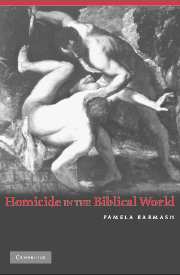Book contents
- Frontmatter
- Contents
- Abbreviations
- Acknowledgments
- Introduction
- CHAPTER ONE A First Case: The Story of Cain and Abel
- CHAPTER TWO Blood Feud and State Control
- CHAPTER THREE The Development of Places of Refuge in the Bible
- CHAPTER FOUR Pollution and Homicide
- CHAPTER FIVE Typologies of Homicide
- CHAPTER SIX Lex Talionis
- CHAPTER SEVEN Interterritorial Law: The Homicide of a Foreign Citizen
- Conclusion
- Appendix: Cuneiform Sources on Homicide
- Bibliography
- General Index
- Index of Citations
CHAPTER SIX - Lex Talionis
Published online by Cambridge University Press: 17 November 2009
- Frontmatter
- Contents
- Abbreviations
- Acknowledgments
- Introduction
- CHAPTER ONE A First Case: The Story of Cain and Abel
- CHAPTER TWO Blood Feud and State Control
- CHAPTER THREE The Development of Places of Refuge in the Bible
- CHAPTER FOUR Pollution and Homicide
- CHAPTER FIVE Typologies of Homicide
- CHAPTER SIX Lex Talionis
- CHAPTER SEVEN Interterritorial Law: The Homicide of a Foreign Citizen
- Conclusion
- Appendix: Cuneiform Sources on Homicide
- Bibliography
- General Index
- Index of Citations
Summary
IN THE Hebrew Bible, an individual found guilty of intentional killing was subject to the most severe penalty, execution. In our analysis of the polluting effects of homicide, we observed that the only means of removing the defilement caused by a homicide was the execution of the intentional killer or the death of the high priest in the case of an accidental killer. The execution of the intentional killer is warranted for another reason, and in order to illuminate this aspect of the punishment, we must turn to another legal text. The sole focus of Lev 24:17–21 is to highlight the punishment for assault and for killing, whether the victim is a human being or an animal:
If a man strikes another and kills him, he shall surely be killed. The one who strikes an animal and kills it shall make restitution, a life for a life. If a man maims his fellow, as he has done so shall it be done to him, a fracture for a fracture, an eye for an eye, a tooth for a tooth, as he maims a man so shall it be done to him. The one who strikes an animal [and kills it] shall make restitution, and the one who strikes a man [and kills him] shall be killed. You shall have one law for both resident alien and citizen, for I am the Lord your God.
In order to understand Lev 24:17–21, we must analyze its literary form.
- Type
- Chapter
- Information
- Homicide in the Biblical World , pp. 154 - 177Publisher: Cambridge University PressPrint publication year: 2004



